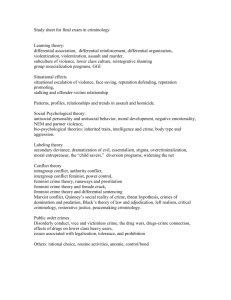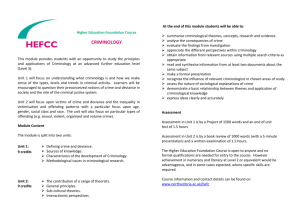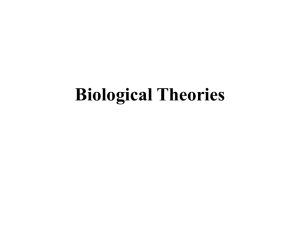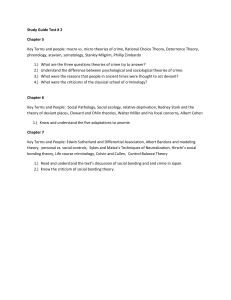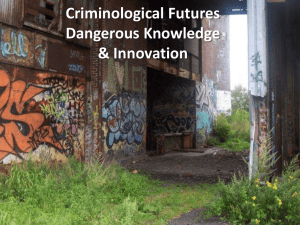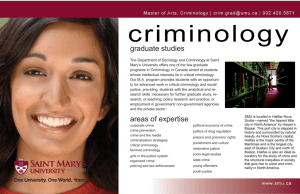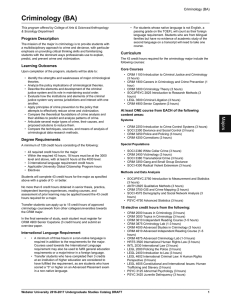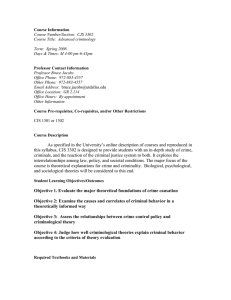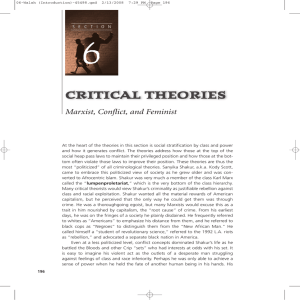Chapter 3 - California State University, Bakersfield
advertisement
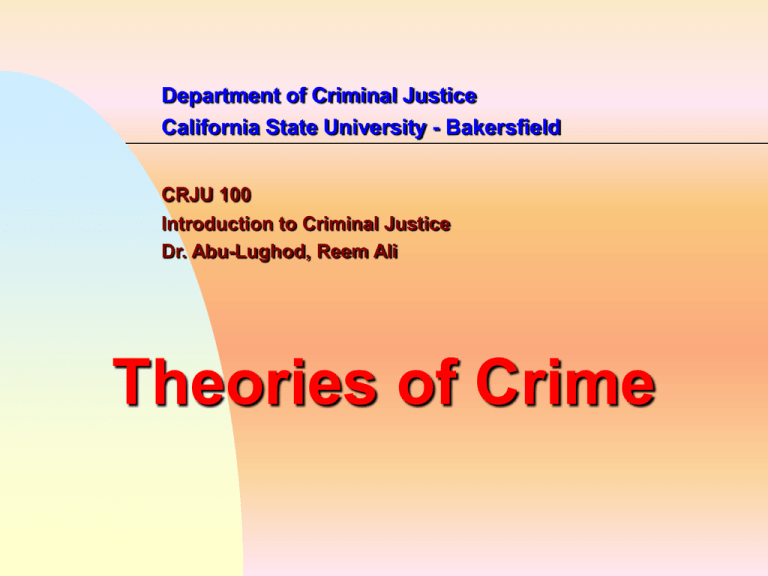
Department of Criminal Justice California State University - Bakersfield CRJU 100 Introduction to Criminal Justice Dr. Abu-Lughod, Reem Ali Theories of Crime Intro: Demonology 1. Supernatural forces 2. Religion and the role of Church 3. Trial by ordeal; guilt or innocence. Today’s perception of GOD, e.g. Andrea Yates Classical School of Criminology Cesare Beccaria and Jeremy Bentham Free will Severity of punishment The “cause” of crime Cesare Beccaria On Crimes and Punishment (1738-1794) His 9 Principles Today: right to confront accusers, speedy trials, presumption of innocence, right not to testify against oneself Bentham “utilitarianism” theory Views on pain and pleasure 4 factors to be considered: duration, intensity, certainty/uncertainty, propinquity or remoteness Today’s shift to focus on policies ands social circumstances The transition to the Positivist School of Criminology Going beyond free will SOCIOLOGICAL THEORIES OF CRIME The environment? The Chicago School Shaw and McKay Social disorganization Curran and Renzetti: not necessarily ethnic ort racial minorities , but deteriorated neighborhoods, economically disadvantaged, weak social norms Differential Association Theory Edwin Sutherland (1883-1950) Association with others, but how does it take place? Differential Association and Behaviorism Aker borrowed from Sutherland and incorporated behavior Operant conditioning Positive/negative reinforcement Modeling others Strain Theory Robert Merton Influenced by Emile Durkheim Anomie and normlessness Merton (unequal access to attain goals in society). SO WHAT? 5 modes of adaptation Neutralization Theory Justification of behavior Sykes and Matza’s 5 techniques (denial) Critical Sociological Theories of Crime Addressing different issues of crime Critical Theory: social justice as a legitimate end Distribution of power in society How power reflect the role of the CJ system “conflict” or “radical” Marxism Karl Marx (1818-1883) Social Theorist: communism reflection Marx’s critique of capitalism and its impact on social justice Argued (after studying capitalism system in Europe) that owners of means of production paid workers poorly and used government to pass laws that prevented reform One with econ power controlled system Institutions (churches, schools, etc…) under control of owner class “false consciousness” Solution in response to “false consciousness” Social class and power in society; corporate versus street crimes GENDER AND JUSTICE Male versus female subjects Feminist movements in 1960s FEMINISM/FEMINIST views Curran & Renzetti identify 3 ways crime can be perceived from feminist views: 1. LIBERAL FEMINISM and criminology 2 issues: 1) power for accomplishment versus gender 2) behavioral approaches among men and women The opportunity for women to commit crime 2. RADICAL FEMINIST crim Sexism in a patriarchal society Rape, pornography Are we addressing their concerns? 3. SOCIALIST FEM crim Social class and gender as a disadvantaged status Social control as a reason for deviance and violence What if race becomes a factor? Feminist perspective as a social movement 4. CRITICAL RACE T Overrepresentation of people of color in CJS “ we are as nation of laws and not of men” Legitimizing white supremacy and oppression of the weaker class INTEGRATED T Bridging together different T and disciplines Possible research designs Social context within which crime exists
